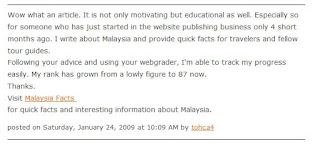Do you know? A week doesn't go by without someone asking me whether they should pay a company to build links the wrong way.
So, what's the wrong way?
Borrowing
I guarantee that someone will leave a comment on this post with a link to their website in the body of their comment. Here's an example.

This is borrowing links.
Many blogs allow commenters to insert links into the body of their comments. Many don't.
So, these link borrowers also resort to inserting their keywords where their name is supposed to go. I wrote a controversial post about this bad practice previously, "Why Leaving Comments is Not a Link Building Strategy."
Our blog software's spam filter catches many of these comments. Yet not every site has spam filters in place, and many people automate or just cut and paste such comments all over the web. This is borrowing and it is wrong. Doing it might get you a short-term, unsustainable burst in rankings. But these are not high quality links. And won't provide long term advantage.
Begging
Then, there's the beggars. They send emails to people they don't know asking for links.
I recently received a really creative e-mail. The person inroduced himself as a big fan of my writing and suggested that "based on reading what I write" I should check out this new social networking site. He wrote about how awesome the site was (without any explanation why). He suggested that I should write about it because everyone else who did it received floods of traffic. He got very offended when I responded that I wasn't interested and that he should be more upfront about his link begging intentions.
Of course, begging comes in many forms. Not all are as creative as this guy. Most people just send emails to webmasters asking them to link to them. While begging is one way to build links, it is ineffective and the fastest way to annoy a webmaster.
Bartering
I'll link to you, if you link to me. I'll buy your services, if you buy mine. I'll show you mine, if you show me yours.
Aah. How adolescent does that sound? And how much easier do you think you can make it for Google to detect that you didn't earn that link? Google's power is that it detects patterns. This is a pretty easy pattern to detect: "Site B links to Site A. Site A links to Site B."
Of course, bartering or trading links gets more creative by saying, "I'll link to you, if you link to him and I'll link to this other guy if he links to you, etc." There are even networks you can join to facilitate this process.
Participating in these "link building rings" is even riskier than regular bartering. It's believed that Google labels websites into "neighborhoods." There are "bad neighborhoods" that you don't want to live in. By interlinking with websites in a bad neighborhood, Google will think you too are bad.
Bribing
Many companies try to bribe webmasters and bloggers for links. We'll send you stuff if you link to us. Although harder for Google to detect, this isn't a great practice. In fact, the FTC frowns upon this. I'm not sure whose wrath I'd fear more--the FTC's or Google's. Either way, it is best to not disobey the government.
Buying
Several sites and services help you buy text links on other sites that pass SEO credit. There is also a black market in link buying that is much less formal, more secretive and not necessarily that organized. I wouldn't recommend either one.
If you're not too averse to risk taking, this is probably the most effective link building strategy of the Bad B's, because you can control what sites you are getting links from, and analyze these sites to ensure that you are not placing links in bad neighborhoods. You can also place links within relevant content and use anchor text for the keywords you are trying to rank for. But, and it's a big but, it's still risky. Google explicitly states:
However, some SEOs and webmasters engage in the practice of buying and selling links that pass PageRank, disregarding the quality of the links, the sources, and the long-term impact it will have on their sites. Buying or selling links that pass PageRank is in violation of Google's webmaster guidelines and can negatively impact a site's ranking in search results.
Therefore, although it might work, I do not advocate buying links.
In fact, as you might have guessed, we do not advocate borrowing, begging, bartering, bribing or buying links.
If I had to pick a winner in the fight between a surreptitious link builder or Google's algorithms, I'd pick the algorithms. In other words, Google will eventually perfect their detection of who is B'ing links and who is earning them.
I personally know entrepreneurs with websites that were generating tens of thousands of dollars one month and zero the next because of practicing the Bad B's of link building.
Don't do it. The risk isn't worth it. Learn to build links the right way.


